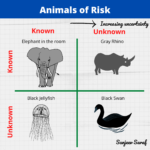Recently, members of Congress sent a letter to OSHA chief, Jordan Barab, to expand PSM standard to address reactive chemicals.
Reactive chemicals have gained increasing attention since the Chemical Safety Board (CSB) released its report on reactive chemicals in 2002. Now I have been working in the area of reactive chemicals since 1999 and let me assure you that one cannot say let us regulate chemical A because it is a reactive chemical.
What Are Reactive Chemicals? Is Water Reactive?
Any substance that reacts to produce hazardous situations in principle is a reactive chemical.
So water by itself may not be reactive but water can react with other substances (e.g. acetic anhydride, sodium amide, sodium azide) in a violent manner. Can we regulate water hazards?
Nature and Nurture
Some chemicals are reactive by nature…some become violent depending on prevailing conditions.
It is clear that a simple of list of reactive chemicals is not sufficient in reducing reactive incidents. A reactive chemical incident is often a result of external situations/conditions.
Thus to address the issue of reactive chemical hazards we need to assess (a) chemicals and (b) conditions under which the chemical may decompose or react with other chemicals. Armed with knowledge one can now start investigating appropriate risk mitigation techniques to minimize risks from reactive chemicals.
Regulating Reactives
The folly of current regulations/standards is that they focus on a list of chemicals to manage reactive hazards.
For the sake of discussion, if OSHA were to act on regulating reactive chemicals most likely it will start with its list of highly hazardous chemicals.
But we cannot rely on a simple list to manage reactivity hazards effectively. We know that reactivity hazards are influenced by external stimuli such as loss of cooling, impact, metal contamination, etc.
To provide a framework for managing reactvity hazards, we need to follow the cybernetic principle:
In order to manage a complex issue you need an even more complex management system.
In the coming few weeks, I will post on advanced techniques to identify and manage reactive chemicals hazards. Please subscribe to the blog to stay updated.





